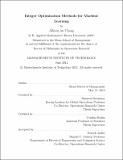| dc.contributor.author | Chang, Allison An | en_US |
| dc.contributor.other | Massachusetts Institute of Technology. Operations Research Center. | en_US |
| dc.date.accessioned | 2012-09-11T17:32:28Z | |
| dc.date.available | 2012-09-11T17:32:28Z | |
| dc.date.copyright | 2012 | en_US |
| dc.date.issued | 2012 | en_US |
| dc.identifier.uri | http://hdl.handle.net/1721.1/72643 | |
| dc.description | Thesis (Ph. D.)--Massachusetts Institute of Technology, Sloan School of Management, Operations Research Center, 2012. | en_US |
| dc.description | This electronic version was submitted by the student author. The certified thesis is available in the Institute Archives and Special Collections. | en_US |
| dc.description | Cataloged from student-submitted PDF version of thesis. | en_US |
| dc.description | Includes bibliographical references (p. 129-137). | en_US |
| dc.description.abstract | In this thesis, we propose new mixed integer optimization (MIO) methods to ad- dress problems in machine learning. The first part develops methods for supervised bipartite ranking, which arises in prioritization tasks in diverse domains such as information retrieval, recommender systems, natural language processing, bioinformatics, and preventative maintenance. The primary advantage of using MIO for ranking is that it allows for direct optimization of ranking quality measures, as opposed to current state-of-the-art algorithms that use heuristic loss functions. We demonstrate using a number of datasets that our approach can outperform other ranking methods. The second part of the thesis focuses on reverse-engineering ranking models. This is an application of a more general ranking problem than the bipartite case. Quality rankings affect business for many organizations, and knowing the ranking models would allow these organizations to better understand the standards by which their products are judged and help them to create higher quality products. We introduce an MIO method for reverse-engineering such models and demonstrate its performance in a case-study with real data from a major ratings company. We also devise an approach to find the most cost-effective way to increase the rank of a certain product. In the final part of the thesis, we develop MIO methods to first generate association rules and then use the rules to build an interpretable classifier in the form of a decision list, which is an ordered list of rules. These are both combinatorially challenging problems because even a small dataset may yield a large number of rules and a small set of rules may correspond to many different orderings. We show how to use MIO to mine useful rules, as well as to construct a classifier from them. We present results in terms of both classification accuracy and interpretability for a variety of datasets. | en_US |
| dc.description.statementofresponsibility | by Allison An Chang. | en_US |
| dc.format.extent | 137 p. | en_US |
| dc.language.iso | eng | en_US |
| dc.publisher | Massachusetts Institute of Technology | en_US |
| dc.rights | M.I.T. theses are protected by
copyright. They may be viewed from this source for any purpose, but
reproduction or distribution in any format is prohibited without written
permission. See provided URL for inquiries about permission. | en_US |
| dc.rights.uri | http://dspace.mit.edu/handle/1721.1/7582 | en_US |
| dc.subject | Operations Research Center. | en_US |
| dc.title | Integer optimization methods for machine learning | en_US |
| dc.type | Thesis | en_US |
| dc.description.degree | Ph.D. | en_US |
| dc.contributor.department | Massachusetts Institute of Technology. Operations Research Center | |
| dc.contributor.department | Sloan School of Management | |
| dc.identifier.oclc | 807180339 | en_US |
